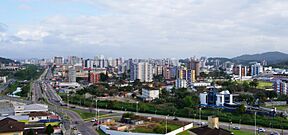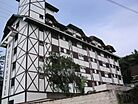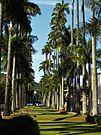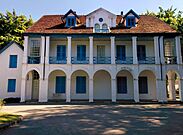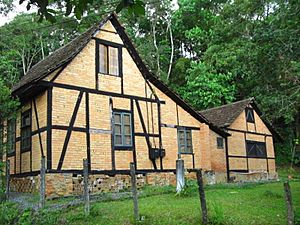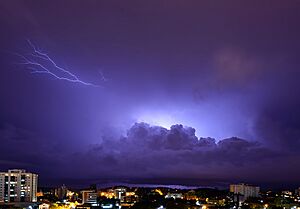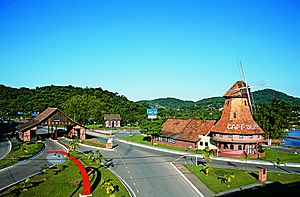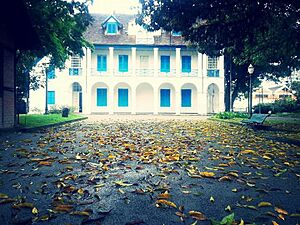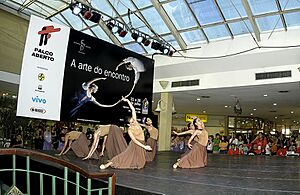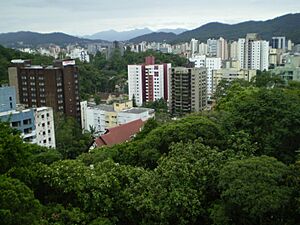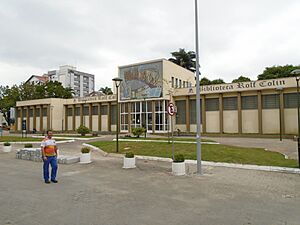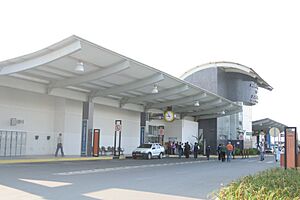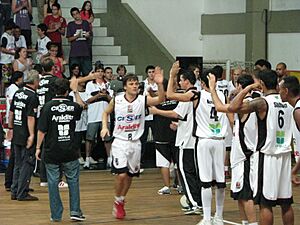Joinville facts for kids
Quick facts for kids
Joinville
|
|||
|---|---|---|---|
|
Municipality
|
|||
| Municipality of Joinville | |||
|
From the top, clockwise: skyline of downtown Joinville, Memory Station, the National Museum of Immigration and Colonization, Rua das Palmeiras, and Holz Hotel
|
|||
|
|||
| Nickname(s):
City of Princes, City of Flowers, Brazilian Manchester
|
|||
| Motto(s):
Mea Autem Brasiliæ Magnitudo
|
|||
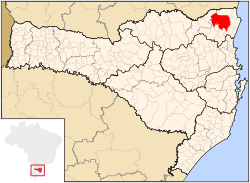
Location of Joinville
|
|||
| Country | |||
| Region | South | ||
| State | |||
| Mesoregion | Norte Catarinense | ||
| Microregion | Joinville | ||
| Founded | 9 March 1851 | ||
| Named for | François d'Orléans, Prince of Joinville | ||
| Area | |||
| • Total | 1,131 km2 (437 sq mi) | ||
| Elevation | 4 m (13 ft) | ||
| Population
(2022)
|
|||
| • Total | 616,317 | ||
| • Density | 544.93/km2 (1,411.4/sq mi) | ||
| Time zone | UTC-3 (UTC-3) | ||
| Postal Code |
89200-000
|
||
| Area code(s) | +55 47 | ||
| HDI (2010) | 0.809 – very high | ||
Joinville is the biggest city in Santa Catarina, a state in the Southern Region of Brazil. It is the third largest city in southern Brazil, after the state capitals of Curitiba and Porto Alegre. Joinville is also a major center for industries, money, and trade.
The city has a very high quality of life, ranking 21st in Brazil. One study even called Joinville the second best city to live in Brazil! Joinville is known by many cool nicknames like "Brazilian Manchester," "City of Flowers," "City of the Princes," "City of Bicycles," and "City of Dance."
It's famous for hosting the Joinville Dance Festival, which is the largest dance festival in the world. It also has the only branch of the famous Bolshoi Ballet School outside of Russia.
In 2020, about 597,658 people lived in Joinville. Many of them have family roots from Portugal, Germany, Switzerland, Norway, and Italy. The larger area around the city is home to over 1.3 million people.
Because of its growth and good facilities, Joinville is a popular place for big events and business meetings. The city has one of the highest living standards in Latin America.
Contents
History of Joinville
![]() Empire of Brazil 1851–1889
Empire of Brazil 1851–1889
![]() Republic of Brazil 1889–present
Republic of Brazil 1889–present
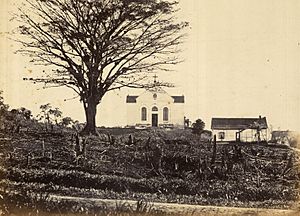
The land where Joinville now stands was home to the Guarani people for about 7,000 years before European settlers arrived.
Even though Joinville is seen as a German-Brazilian city, its beginnings are actually French. The area was first called Colônia Dona Francisca. It was meant to be a gift for the future husband of Princess Francisca of Brazil. She was the sister of Emperor Pedro II. In 1843, Princess Francisca married François d'Orléans, Prince de Joinville. He was the son of King Louis-Philippe of France, and this marriage made him the owner of these lands.
In 1851, after the French monarchy ended, the French prince decided to let a part of his Brazilian land be used. He worked with German Senator Mathias Schröder. Schröder had started the Colonization Society of Hamburg. This group of bankers and business people encouraged people from Northern Europe to move to Brazil and start new communities.
In 1851, the first 118 German and Swiss immigrants arrived in Joinville. Soon after, 74 Norwegian immigrants also came. A special Royal Palace was built in the city for the prince and princess of Joinville. Between 1851 and 1888, about 17,000 German immigrants settled in Joinville.
How Joinville Was Founded
The city of Joinville was officially founded by German, Norwegian, and Swiss settlers on March 9, 1851. The Norwegian settlers included many skilled workers like carpenters, masons, bakers, and even a veterinarian and doctor.
Life was hard for the first Norwegian settlers. Many got sick from diseases like dysentery and typhoid. In a letter from July 1851, it was reported that "only" four Norwegians had died so far. Between 1851 and 1852, 41 Norwegians left Joinville, and seven passed away.
In 2001, a monument was built by the Rio Cachoeira in the city center. It honors the Norwegian, Swiss, and German settlers who helped build Joinville.
Geography and Climate
Joinville is located in the northeast part of Santa Catarina state. It is close to the Atlantic coast and has the Cachoeira River flowing through it. The city is also not far from the border with the state of Paraná and its capital, Curitiba.
Joinville has a port on Babitonga Bay. This bay connects to the Atlantic Ocean and is very important for sending out products made in the city.
Joinville's Weather
Joinville has a humid subtropical climate. This means it has warm, humid summers and mild winters. Because it's close to the Atlantic Ocean and not very high above sea level, the temperature doesn't change much throughout the year. Most months have average high temperatures in the 20s Celsius.
Sometimes, strong storms called South Atlantic cyclones can hit Joinville. One famous example was Cyclone Catarina in 2004.
| Climate data for Joinville (Univille) (1976–2005) | |||||||||||||
|---|---|---|---|---|---|---|---|---|---|---|---|---|---|
| Month | Jan | Feb | Mar | Apr | May | Jun | Jul | Aug | Sep | Oct | Nov | Dec | Year |
| Mean daily maximum °C (°F) | 29.8 (85.6) |
29.8 (85.6) |
28.2 (82.8) |
27.7 (81.9) |
25.2 (77.4) |
22.5 (72.5) |
21.6 (70.9) |
22.6 (72.7) |
22.5 (72.5) |
24.4 (75.9) |
26.6 (79.9) |
29.9 (85.8) |
25.9 (78.6) |
| Mean daily minimum °C (°F) | 21.4 (70.5) |
20.5 (68.9) |
19.8 (67.6) |
18.5 (65.3) |
16.1 (61.0) |
13.6 (56.5) |
12.9 (55.2) |
13.5 (56.3) |
15.3 (59.5) |
17.0 (62.6) |
18.6 (65.5) |
20.2 (68.4) |
17.3 (63.1) |
| Average precipitation mm (inches) | 258.0 (10.16) |
234.0 (9.21) |
216.0 (8.50) |
122.1 (4.81) |
111.3 (4.38) |
98.6 (3.88) |
107.7 (4.24) |
98.0 (3.86) |
137.0 (5.39) |
173.4 (6.83) |
159.0 (6.26) |
208.0 (8.19) |
1,923.1 (75.71) |
| Average relative humidity (%) | 84 | 85 | 87 | 84 | 85 | 85 | 88 | 88 | 88 | 87 | 87 | 84 | 86 |
| Source: Empresa Brasileira de Pesquisa Agropecuária (EMBRAPA) | |||||||||||||
City Neighborhoods
Joinville is made up of many different neighborhoods, including:
- Adhemar Garcia
- América
- Anita Garibaldi
- Atiradores
- Aventureiro
- Boa Vista
- Boehmerwald
- Bom Retiro
- Bucarein
- Centro
- Comasa
- Costa e Silva
- Dona Francisca
- Espinheiros
- Fátima
- Floresta
- Glória
- Guanabara
- Iririú
- Itaum
- Itinga
- Itoupava Açu
- Jardim Iririú
- Jardim Paraíso
- Jardim Sophia
- Jarivatuba
- João Costa
- Morro do Meio
- Nova Brasília
- Paranaguamirim
- Parque Guarani
- Petrópolis
- Pirabeiraba-centro
- Rio Bonito
- Rio Velho
- Saguaçu
- Santa Catarina
- Santo Antônio
- São Marcos
- Vila Cubatão
- Vila Nova
- Zona Industrial Norte
- Zona Industrial Tupy
Culture and Fun in Joinville
Joinville is well-known for its strong German-influenced culture. You can see this in the city's buildings, local foods, festivals, and the daily life of its people.
Joinville hosts the Festival de Dança de Joinville (Joinville Dance Festival) every July. This is the world's largest dance event! Joinville is also the only city outside of Moscow that has a school of the Bolshoi Ballet. This is a very famous Russian Ballet Company.
The city has a Catholic bishop, several Lutheran churches (one of the biggest communities in Brazil), a Botanical Garden, and a Zoo. Parks and several beaches are less than an hour's drive away. Joinville is also home to several museums, including the "MUBI" bicycle museum.
The Royal Palace, built in the mid-1800s, is now the National Museum of Immigration History. It tells the story of the challenges German immigrants faced when they came to Brazil in the 1800s. It has furniture and clothes from that time.
The International Dance Festival
Since 1982, the Joinville Dance Festival brings thousands of professional dancers and viewers from all over the world to the city. The festival happens every year in the second half of July. For 11 days, about 50,000 people come to Centreventos Cau Hansen to watch the performances. This makes it one of the biggest dance events globally.
The Joinville Dance Festival even got a mention in the 2005 edition of the Guinness Book of World Records as the world's "largest dance festival." There are competitions in seven different dance styles, from classical ballet to folk dances. During the festival, many other events like dance classes and talks are also held around the city.
Economy and Industry
Joinville's economy mainly relies on its many factories and businesses. The city is also home to some of Brazil's largest software companies, such as Datasul, Logocenter, Microvix, and SoftExpert.
Many big companies in Brazil have their base in Joinville. These include Tupy, Tigre, Embraco, Döhler, Whirlpool, Wetzel, Busscar, Ciser, and Schulz S/A.
The city has one of the highest living standards in Brazil. Its industrial production is the third largest in Southern Brazil, after the big cities of Porto Alegre and Curitiba. Joinville is also the third most populated city in the southern region of Brazil.
General Motors opened a car engine factory in Joinville in 2012. They plan to invest a lot more money in the coming years to build another factory and a full car assembly line. The nearby town of Araquari has a BMW car manufacturing plant, and its main office is in Joinville.
People of Joinville
Most of Joinville's population are European Brazilians. Their families mainly came from Southern and Central Europe. A smaller part of the population (about 23.6%) are Black or Pardo (people of mixed race).
| Race/Skin color | Percentage | Number |
|---|---|---|
| White | 76.0% | 468,401 |
| Mixed | 19.5% | 120,284 |
| Black | 4.1% | 25,532 |
| Asian | 0.3% | 1,599 |
| Amerindian | 0.1% | 463 |
Source: 2022 census.
Religions in Joinville
The first settlers in Joinville were mostly Lutherans. Today, about 6.13% of the people follow this religion. Most of the Protestants now are of the Pentecostal faith. The first group of the Church of Jesus Christ of Latter-day Saints in Brazil was started in Joinville. Like most of Brazil, the main religion is Roman Catholicism.
| Religion | Percentage | Number |
|---|---|---|
| Roman Catholics | 73.26% | 314,729 |
| Protestants | 22.49% | 96,632 |
| No religion | 2.01% | 8,656 |
Source: IBGE 2000.
Education in Joinville
Joinville is proud to have the best public education system in Santa Catarina, as recognized by the Ministry of Education. Schools generally have good facilities. In 2010, about 97.3% of children aged 6 to 14 were attending school.
English and Spanish are part of the required subjects in high school. Since many people in Joinville have German roots, the German language is also taught in some schools.
Colleges and Universities
Joinville has several options for higher education:
- Public Universities:
* UFSC - Federal University of Santa Catarina * IFSC - Federal Institute of Santa Catarina * UDESC - Universidade do Estado de Santa Catarina
- Private Universities:
* ACE - Associação Catarinense de Ensino * FCJ - Faculdade Cenecista de Joinville * CATÓLICA - Centro Universitário - Católica de Santa Catarina * IELUSC - Instituto Superior e Centro Educacional Luterano Bom Jesus * IESVILLE - Instituto de Ensino Superior de Joinville * INESA - Instituto de Ensino Superior Santo Antônio * SENAI - Serviço Nacional de Aprendizagem Industrial * SOCIESC - Sociedade Educacional de Santa Catarina (pt Wikipedia) * UNIVILLE - Universidade da Região de Joinville
Transportation in Joinville
Airport
Joinville-Lauro Carneiro de Loyola Airport (airport code: JOI) is a smaller airport in southern Brazil. It only handles flights within the country. The airport is about 13 kilometers (8 miles) from the city center.
Highways and Bus Station
The city has the Harold Nielson Bus Station. It has two floors and serves many bus companies. These buses travel daily between cities and states. People can travel by bus 24 hours a day, with tickets sold by different companies.
Joinville is about 135 kilometers (84 miles) from Curitiba on the BR-101 highway. It is also 184 kilometers (114 miles) from Florianópolis, the capital city of Santa Catarina.
Sports in Joinville
Joinville offers many fun sports activities. There is a golf course, a place for horse riding, and a kart racing track. If you love outdoor sports, there are many suitable places. You can even try shooting, which is a German tradition from the Middle Ages still practiced today.
The city also has the largest and best-equipped Yacht Club in Santa Catarina State. Joinville is home to famous teams in basketball, indoor football (futsal), and volleyball. All of these teams are well-known in Brazil's national leagues.
Joinville also has an American Football Club called Joinville Gladiators. They won the SC Bowl three years in a row (2009, 2010, and 2011). They have also done well in the national league.
Sports Clubs
- Joinville Esporte Clube (short: JEC)
The Joinville Esporte Clube football team won the Brazilian Série C (Brazil's third division) in 2011. They also won the Brazilian Série B (second division) in 2014. However, they did not do well in the first division and were moved back down after just one year. The team currently plays in the fourth division, the Série D.
On December 8, 2013, Joinville was in the news for a football game. A match between Clube Atlético Paranaense and Vasco da Gama-RJ at Arena Joinville was stopped because of fights between fans. This game was important for both teams in the top league. Atlético Paranaense was playing in Joinville because they had already been punished for violence at their own stadium in Curitiba, Paraná.
Famous People from Joinville
- Eduardo Fischer, a swimmer
- Jovani Furlan, a ballet dancer
- Luma Grothe, a fashion model
- Maurício Gugelmin, a former Formula One and ChampCar race car driver
- Alexandr Fier, a Brazilian chess Grandmaster
- Ana Lúcia Martins, a politician
- Ana Cláudia Michels, a fashion model
- Vitor Miranda, a thaiboxer and martial artist
- Márcia Narloch, who won a gold medal in the women's marathon at the 2003 Pan American Games
- Daniel Orzechowski, a swimmer
- Tiago Splitter, a basketball player
- Gabriel Sara, a footballer
See also
 In Spanish: Joinville para niños
In Spanish: Joinville para niños
 | Audre Lorde |
 | John Berry Meachum |
 | Ferdinand Lee Barnett |


